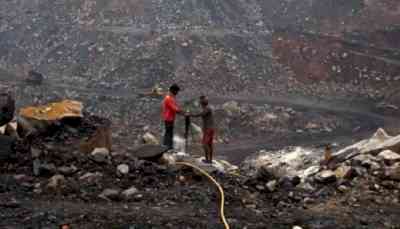India's dependence on coal rises despite its green energy push
Despite India being bullish on green energy options as it aims to achieve net-zero emissions by 2070, the geo-political situation triggered by the Russia-Ukraine war has led to supply chain constraints, rising energy prices and pushing inflation to highest-ever levels in several countries.

ANIMESH SINGH
New Delhi, Nov 13 (IANS) Despite India being bullish on green energy options as it aims to achieve net-zero emissions by 2070, the geo-political situation triggered by the Russia-Ukraine war has led to supply chain constraints, rising energy prices and pushing inflation to highest-ever levels in several countries.
All these factors combined together have compelled India to continue to depend on coal-based thermal energy.
Recently, Union Finance Minister Nirmala Sitharaman said that uncertainties in the energy sector are an area of concern for the government.
She noted that like many other nations, India too will have to rely more on coal in the near future due to global uncertainties and supply chain disruptions.
The Finance Minister even said that India's plan to shift to renewable energy has received a jolt and therefore ways to reduce coal dependency and return to eco-friendly energy resources, need to be devised.
Greenpeace India's Lead for climate and energy campaign Avinash Kumar gave a realistic perspective to India's growing dependence on coal despite its aggressive green energy push.
"As part of the Covid-19 recovery plan, the government opened up its coal mining sector for private players and announced many new coal mines for auction. This new investment planned for coal power plants can impact the progress of clean energy. Ideally these investments should have been for renewables," he said.
Kumar further informed that in the light of the fact that coal is increasingly becoming economically unviable and the cost of renewables continues to drop, there is a need to phase out of coal soon.
India's dependence on coal can be gauged from the fact that owing to the shortage of the fossil fuel in thermal plants, Coal India, the country's largest producer, was in June this year, forced to import 8 million tonnes of coal for this fiscal.
It was for the first time in the 50 years of Coal India's existence that the public sector undertaking was asked to import the dry fuel.
In such a scenario, the COP27 summit, which is currently going on in Egypt's Sharm El-Sheikh, is deliberating on the need for climate funding and on ways to reduce dependence on traditional modes of energy like fossil fuels.
In fact there are voices being raised in the summit, especially by developing economies that major polluters like China should be made to pay towards a climate fund.
India too on its part has been a strong promoter of renewable energy, as it has launched the International Solar Alliance (ISA), encouraging over 150 countries to take advantage of this international initiative.
Recently it also launched LIFE (Lifestyle for Environment), a global movement encouraging people to change their lifestyles and consumption patterns in order to protect the environment.
Ironically though, India has been forced to depend on coal-based energy options due to shrinking global supply chains and rising fuel prices owing to the Ukraine crisis.
In fact Union Coal Minister Pralhad Joshi last month had said that India's dry fuel production will touch 900 million tonnes in the current fiscal. Coal India's production in 2021-22 was 622 million tonnes.
Though the central government is calling its dependence on coal as a temporary phase, it does hamper its efforts to push for greener options.


 IANS
IANS 








